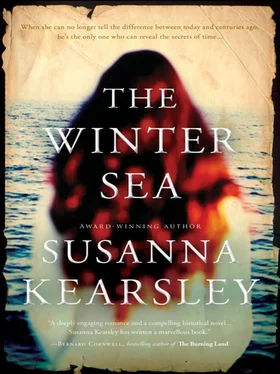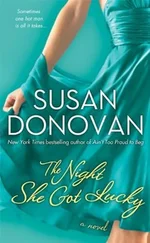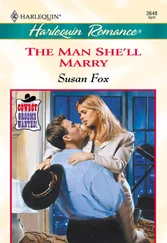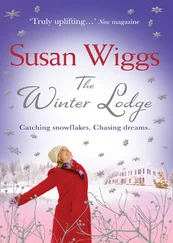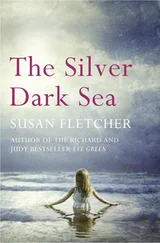Susanna Kearsley - The Winter Sea
Здесь есть возможность читать онлайн «Susanna Kearsley - The Winter Sea» весь текст электронной книги совершенно бесплатно (целиком полную версию без сокращений). В некоторых случаях можно слушать аудио, скачать через торрент в формате fb2 и присутствует краткое содержание. Год выпуска: 2008, ISBN: 2008, Жанр: Историческая проза, на английском языке. Описание произведения, (предисловие) а так же отзывы посетителей доступны на портале библиотеки ЛибКат.
- Название:The Winter Sea
- Автор:
- Жанр:
- Год:2008
- ISBN:9780749080976
- Рейтинг книги:3 / 5. Голосов: 1
-
Избранное:Добавить в избранное
- Отзывы:
-
Ваша оценка:
- 60
- 1
- 2
- 3
- 4
- 5
The Winter Sea: краткое содержание, описание и аннотация
Предлагаем к чтению аннотацию, описание, краткое содержание или предисловие (зависит от того, что написал сам автор книги «The Winter Sea»). Если вы не нашли необходимую информацию о книге — напишите в комментариях, мы постараемся отыскать её.
The Winter Sea — читать онлайн бесплатно полную книгу (весь текст) целиком
Ниже представлен текст книги, разбитый по страницам. Система сохранения места последней прочитанной страницы, позволяет с удобством читать онлайн бесплатно книгу «The Winter Sea», без необходимости каждый раз заново искать на чём Вы остановились. Поставьте закладку, и сможете в любой момент перейти на страницу, на которой закончили чтение.
Интервал:
Закладка:
That said, I have taken a couple of liberties. For all the research I’ve done on John Moray, I don’t know for certain that he was at Malplaquet. But since the only reference to his death that I have found fits with the date of Malplaquet, and since it helped my plot to have him there, I put him on that battlefield, where in the woods the Royal Irish Regiment in fact did meet and fight the Irish Regiment that fought for France and James.
And while it’s also a recorded fact that Captain Gordon captured the Salisbury during the invasion, and that he was the only British captain in the fight to claim a French ship as his prize, there’s also little doubt that Gordon was a Jacobite. And since no one but Gordon knows exactly why he took that ship, I gave him an excuse that seemed to fit the man as I had come to know him.
His Jacobite loyalties lasted the rest of his life. When Queen Anne died in 1714 and the first Hanoverian king, George I, was brought over to sit on the British throne, Gordon refused to take the oath of allegiance, and as a result was dismissed. He promptly accepted a commission in the Russian navy of Tsar Peter the Great, where he served with distinction and rose to be an admiral and the Governor of Kronstadt. Throughout his time in Russia he continued to promote the Jacobite cause, and kept up a correspondence with King James and his supporters. When he died in the spring of 1741, a wealthy and respected man, his obituary in The Gentleman’s Magazine stated he had always been ‘a true Friend to his Countrymen.’
The Duke of Hamilton was not to be so fortunate. By 1711 his ambition was beginning to bear fruit—he’d been raised to the British peerage by Queen Anne, and had just been appointed ambassador to France. But before he could travel to Paris to take up his post, his longstanding dispute with a rival, Lord Mohun, flared into a duel. The two men met at dawn in Hyde Park, London, one November morning. Both men drew their swords, and in the fight that followed both were killed. The incident caused quite a scandal in its day, and the details of what really happened and why have been debated ever since. In death, as in life, he defies all attempts at an easy analysis.
As for Moray’s uncle, Colonel Patrick Graeme, it is not difficult to trace his early life in Scotland, when he served as Captain of the Edinburgh Town Guard before his conscience made him take up arms for old King James and follow James to France in exile. But I haven’t yet discovered how he spent his later years, after the failed invasion in ’08. However, since I’m sure his nature would have kept him near the action, I am hopeful that I’ll someday come across a letter or a document that shines a light on his adventures in that time before his death in August, 1720.
More light, too, is needed on Anne Drummond, Countess of Erroll, who becomes all but invisible in the years following the ’08—no easy task for a woman of such forceful character.
Her son Charles, 13th Earl of Erroll, continued to fight for the rights of his countrymen after the Union which he had so passionately opposed. Though his position as Lord High Constable of Scotland meant he was expected to take part in the coronation of George I, he refused to attend the ceremony. He died not long after, in 1717, at the age of 40, unmarried and childless, the last male of his line. His title passed to his sister Mary who, like all the Countesses of Erroll, was a woman of great courage and a fierce supporter of the Stewart cause.
Nathaniel Hooke, who had put so much time and effort into bringing about the invasion of 1708, was deeply disappointed by its failure, and highly critical of the French commander who had led it. Though he had a long and successful career in the diplomatic service of France, he returned to his memories of the ’08 in his later years, and with the help of his nephew began compiling his various papers and journals relating to the adventure. He died in 1738, before the task was completed, and when his son attempted to sell the papers two years later an officer of the French court arrived instead to confiscate them. Those papers that were taken were presumably destroyed, and lost to history. But two packets of documents in Hooke’s nephew’s handwriting had escaped the attention of the French official, who luckily for us had no idea they contained Hooke’s own account of his negotiations for the planned invasion.
Of such small unexpected accidents is history made.
And no one was the victim of more accidents than young James Stewart—by his birthright James VIII of Scotland and III of England. There is some reason to suspect that his half-sister Queen Anne was indeed giving serious thought to naming James her heir, and in the last years of her reign there appears to have been a great deal of behind-the-scenes negotiating going on. In the midst of this, the war of the Spanish succession was ended by the Treaty of Utrecht, which among its terms demanded that Louis XIV expel James from France. James went willingly, moving his court to Lorraine where he promptly gave all of his Protestant servants the freedom to worship in their own faith, something he hadn’t been able to do when his court had been bound by French laws.
But James was still a Catholic, and when Queen Anne died in 1714 it was the Protestant contender, George I, who won the crown.
The reply was another Jacobite rising in 1715, and although this time James did manage to land safely in Scotland, just north of Slains at Peterhead, the golden opportunity of 1708 had passed. The western Presbyterians who had been so prepared in the ’08 to rise for James this time opposed him. The rebellion failed. James retreated to Lorraine, but King Louis XIV had died and without the old king to console and support him James found his French neighbors unwelcoming, so he moved his court again, at first to Avignon, and finally Rome.
Two more attempts to gain his throne involving the help of the Swedes and the Spanish came to nothing, and even James’s marriage in 1719 to the Princess Maria Clementina proved less than successful. After six years, she left him and retired to a convent, though not before she gave him sons. The elder of these, Charles Edward, grew to be that ‘Bonnie Prince’ whose handsome face and charming ways would rouse the Scottish Jacobites to take up arms again and march beside him twenty-five years later…but that is another story, and too sad to tell.
I much prefer to think of James VIII and III in his old age in Rome, perhaps half-dozing in the sunshine of a warm Italian afternoon, and dreaming of the northern coast of Scotland and the proud red walls of Slains as he’d once seen them from the sea, and of the crown that must have, for that moment, seemed so nearly within reach.
A NOTE OF THANKS
When doing my research, like most writers, I must depend on the kindness of strangers, and in Cruden Bay I was spoiled by kindness. So many people, from the shopkeepers to people I passed on the street, gave me friendly advice and assistance, that even if I’d learnt their names I doubt I’d have the space to list them here.
I’m grateful above all to Joyce, Stuart and Alison Warrander of the St Olaf Hotel, where I stayed, who made sure that my room (#4) had a view of both Slains and the sea, so that I could imagine what Carrie was seeing; and to Stuart’s brother, who read and corrected my use of the Doric. The Warranders and their staff were incredibly helpful to me, as were their regulars in the hotel’s public bar, who cheerfully answered my questions and even suggested the perfect place for me to put Carrie’s cottage. My thanks also to all the drivers of Elaine’s Taxis who ferried me around, and to Elaine herself who took good care of me and even switched the meter off one afternoon to help me hunt down some of my elusive settings. I’m also grateful to the landlord and staff of the Kilmarnock Arms, and to local historian and fellow author Mrs Margaret Aitken and her husband James and daughter, who were kind enough to have me in to tea and share their knowledge of the history of the area. I’m indebted to both Brenda Murray and Rhoda Buchan of the Cruden Bay library, who searched out articles and books for me and found me details I could not have found myself, without them.
Читать дальшеИнтервал:
Закладка:
Похожие книги на «The Winter Sea»
Представляем Вашему вниманию похожие книги на «The Winter Sea» списком для выбора. Мы отобрали схожую по названию и смыслу литературу в надежде предоставить читателям больше вариантов отыскать новые, интересные, ещё непрочитанные произведения.
Обсуждение, отзывы о книге «The Winter Sea» и просто собственные мнения читателей. Оставьте ваши комментарии, напишите, что Вы думаете о произведении, его смысле или главных героях. Укажите что конкретно понравилось, а что нет, и почему Вы так считаете.
